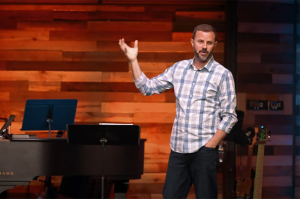Dissident Presbyterians Propose 'Radical Change'
Orthodox Presbyterians have proposed a "radical change" to how Presbyterians handle church government. Ditching the hierarchical model widely used by mainline denominations, dissident Presbyterian Church (U.S.A.) members recently voted on a new model for the postmodern era.
"As we move out of a modernist era into a postmodern era, the modernist structure – bureaucratic, centralized authority, hierarchical top-down leadership – doesn't work anymore," the Rev. Dr. D. Dean Weaver, senior pastor of Memorial Park Presbyterian Church in Pittsburgh, told The Christian Post.
Weaver attended a winter convocation over the weekend where the New Wineskins Association of Churches (NWAC) and other Presbyterians discontent with the PC(USA) unanimously voted to pass a proposal that offered congregations two options: to continue to remain within the PC(USA) and be a faithful witness there; or to realign with another Presbyterian body. More specifically, the Evangelical Presbyterian Church (EPC) invited congregations to create a non-geographic presbytery named after New Wineskins under the EPC.
The New Wineskins Presbytery would run under a newly designed constitution based on a grassroots polity, Weaver described. The new polity recognizes the local congregation as the primary decision-making group. And it sends resources to the congregation rather than drain away from, he added.
"It's almost a total flipping of the pyramid, if you will," explained Weaver, who also serves as co-moderator of the NWAC. "It's much more of an adaptive model for the 21st century than the model that got us through the 1920s to the 1950s."
No other denomination has adopted such a polity, according to Weaver.
Meanwhile, the continuing decline in membership and financial support have led up to the PC(USA)'s first church-wide meeting on the future of its current government structure. The meeting, opening Wednesday, will focus on middle governing bodies - presbyteries and synods. Weaver, however, believes the meeting is "too little, too late."
"Most churches don't even know what a synod is," he pointed out. "I don't think there's anybody out there who thinks synods should continue, except for maybe people who work for synods."
Eliminating synods, however, would take years in a large structure like the PC(USA) - the largest Presbyterian denomination in the United States. "Big ships turn slowly," Weaver commented.
"So even that change is one that will take years and will have virtually little or no effect. Meanwhile, the denomination will continue to hemorrhage 40- to 80,000 members a year. I'd say it's a symbolic gesture that it's too little, too late."
The "hemorrhaging" began in the summer of 2001, Weaver pointed out. The PC(USA) General Assembly would not affirm that Jesus Christ is the only way to God.
"The catalyst all along has not been homosexuality and homosexual ordination," explained Weaver. "The issue all along has been who is Jesus and what the Church believes and what the Bible is – the real bedrock foundational issues of the faith."
While churches have already decided or are in the process of deciding to exit the denomination, Weaver did not call it "leaving" the national body. Rather, it is "realignment."
"We believe the PC(USA) has left us," he highlighted. "We haven't changed anything. The denomination has changed. It's just a matter of realignment."
And Presbyterians are not alone in their discontent with national denominations. Many are leaving mainline churches and many are upset, as Weaver noted.
The radical model that Orthodox Presbyterians are proposing, however, may be the "first architectural proactive solution to the problem."
"We're not just leaving to go to another denomination," he noted. "We're actually realigning to help join with other brothers and sisters in Christ who want to form a whole new type of missional and evangelical Presbyterianism."
Individual Presbyterian congregations were encouraged to vote to remain in the PC(USA) or to realign by NWAC's next convocation in October.




























